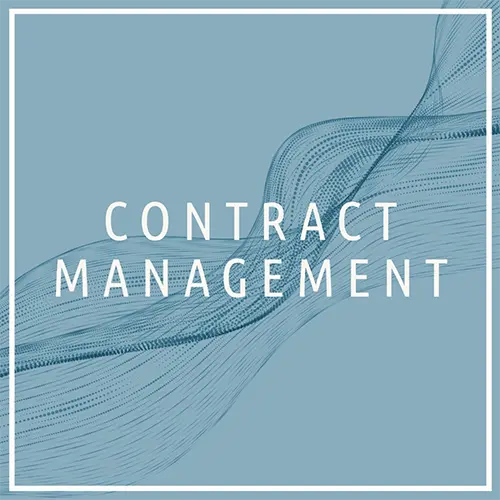What is contract management?
Contract management encompasses all processes that deal with the handling of contracts within a company. Accordingly, it maps all contractual processes between the client and the contractor. It covers the entire contract lifecycle, which is why contract management is also referred to as contract lifecycle management (CLM). The approach already begins with the initial contract negotiation and runs through the creation, administration, adaptation and execution to the archiving of a contract. Thus, contract management is a kind of collective term for all activities and processes in which the creation and execution of contracts play a role.
Since contract management covers a wide range of topics and many different company departments and areas are involved, it is often divided into two or even three sub-areas for the sake of simplicity: Contract administration, contract controlling and, as a third sub-area, contract archiving.
Table of Contents
What does contract management involve?
Contract management is often associated with and usually equated with the term “contract administration”. However, contract management encompasses much more than just contract administration. Contract controlling with analysis, (risk) assessment as well as control and archiving are also part of contract management.
Contract administration
The main objective of contract administration is to optimise contract management. The focus is on collecting information for a contract and structuring it. Typical tasks of contract administration are, among others:
- Comparison and processing of offers
- Drafting contracts, including developing draft contracts and negotiating them
- Reviewing contracts and documents
- Monitoring contract performance with regard to contract terms and conditions
- Clear presentation of relevant contract information as a working basis for other departments
- Monitoring of deadlines and time limits, e.g. notice periods
- Invoicing, also automated for recurring invoices
- (archiving)
Contract controlling
Like contract administration, contract controlling deals with the collection of information. However, the information collected is aimed more at analysing and evaluating contracts so that risk assessments can subsequently be created with their help. In concrete terms, the aim is to assess which types of contracts with which contract partners are lucrative and ensure a high turnover. Thus, frequently asked questions in contract controlling are:
- Who are the most important contractual partners?
- What turnover potential does each individual contract partner offer per year?
- What is the current ratio of existing customers to new customers?
- How high is the value assessment of the existing contracts?
- How high are the costs from current contracts?
- What opportunities and risks do the individual contractual partners offer?
- What risks do individual contracts entail?
Archiving
The archiving of contracts comprises the third sub-discipline in contract management. This is particularly concerned with the aspect of audit security. Among other things, it must be ensured that archived contracts as well as the associated documents can be unalterably stored at a specific location in the long term. In the age of digitalisation, companies are tending more and more towards digital archiving of their documents that accrue in the company. Especially due to the constantly increasing flow of information and the higher volume of documents that have to be archived in an audit-proof manner, a central storage location is an advantage. This ensures that contract controlling and contract administration also have access to all important documents and contracts.
Note: The topic of archiving as part of contract management is counted as part of contract administration in many companies. However, as the archiving of documents can be complex and highly extensive, we consider it here as an independent sub-discipline.
Who is involved in contract management?
From an economic point of view, contract management plays a central role in a company. It is safe to say that it is a core process in the company and touches almost all departments of the company. Good contract management is characterised by the fact that several departments are not occupied with the same task or matter, thus avoiding unnecessary parallel processing.
The following departments in the company usually deal with contract management on a regular basis:
- Sales: Concludes contracts with new customers and handles them.
- Procurement: Concludes contracts with business partners such as suppliers, brokers and partners and processes them.
- Legal: Monitors compliance with legal and social regulations.
- IT: Is responsible for the procurement of software, e.g. the contract management software; but also for leasing contracts, e.g. for hardware.
- Human Resources: Creates and manages employment contracts, application documents, digital personnel files, etc.
- Bookkeeping and accounting: Creates invoices (automated invoicing is also possible with contract management software).
- Controlling: Deals with risk assessment of already existing contracts.
- Management: Coordinates and monitors higher-level business interests of the company based on contractual risks.
Project management staff in particular are highly affected by contracts and agreements. For example, during a project, various agreements may arise from the cooperation with the client or partner or may have already been agreed in advance. These legal agreements, which represent an obligation, need to be recorded and monitored. This is also part of contract management.
Why does it make sense to have a contract management system?
When it comes to working with partners and customers in a company, this always involves risks – for both sides. To keep these risks as low as possible, expectations and wishes are recorded as agreements, in the form of contracts. However, if contract management is poor, this can have serious consequences for the company or the partner or customer.
A major risk, for example, is the lack of standardised software for contract management or its inefficient use. This often leads to unequal information levels in the various departments involved in contract management. Audit-proof archiving and the retrieval of important documents and contracts is also not guaranteed if there is no sensible system for archiving. Contracts may even be lost completely. Moreover, without a uniform system it is usually difficult to keep track of contractual agreements. Legal regulations are simply “overlooked”. As a result, unnecessary costs and unwanted renewals usually arise, while profitable revenue opportunities are missed. In the worst case, contracts are unknowingly breached, which can result in fines or other legal consequences.
To counteract these risks and problems, it is important to have efficient contract management. Probably the biggest motivator for companies is the cost factor. A professional contract system frees up resources that can be used in other areas. In addition, the continuous monitoring of contractual deadlines and dates makes it very easy to meet all termination deadlines. Reporting and monitoring obligations are not so easily overlooked either.
The company B. Electronics, headquartered in Hanover, wants to relocate to Munich. The rental contract for the new premises has already been signed, but the old contract still has to be terminated. However, the responsible employee has left the company and the termination date is in one week. Without notice, the lease is automatically renewed for one year.
- With intelligent contract management software, every employee with access can monitor the notice period and inform the responsible person, or in case of doubt, the managing director. Notifications of cut-off dates are sent automatically by email.
- Without efficient contract management, the deadline could be overlooked. No one feels responsible, there is no overview. The deadline is missed and the contract is extended by one year.
Note: The situation is similar with leasing contracts, for example. The same principle applies here, accordingly similar measures are applicable.
Contract management using contract management software
Contract management is practised in almost all companies. However, there are considerable differences in the way and also the “quality” of how it is done. As already mentioned, working with contractual partners entails a number of risks. In order to minimise these risks, the use of a software solution makes sense. The use of software is not limited to large companies. Small and medium-sized companies also benefit from it, because the solutions are no longer as cost-intensive as they used to be. The use of contract management software thus ensures a noticeable reduction in costs.
The software used for contract management is usually called contract management software (CMS) (note: not to be confused with content management software, also abbreviated CMS). Contract management software can work on different levels: As on-premises software, as cloud software or as a cloud-based software-as-a-service (SaaS) model. The advantage of SaaS solutions is that it is a kind of “rental model”, which only requires monthly fees rather than the complete acquisition costs of a new software solution.
When choosing software for one’s own company, the IT procurement should select the solution that best fits the company’s strategy and covers all requirements.
Digital contract management with Microsoft 365 and SharePoint Online
Microsoft 365 and SharePoint Online are already in use at many companies. Yet, the corporate staff are often not even aware of the potential they offer, as they only work with Microsoft Teams, for example. However, with SharePoint Online and the Power Platform, Microsoft 365 already provides the basic tools for efficient contract management software.
Nevertheless, it takes quite a bit of expertise and, above all, resources to build highly functional (business) applications on your own from the given basic equipment. That is why Portal Systems specialises in providing standardised professional applications that are already pre-configured. With our cloud-based software solution for contract management – Shareflex Contract – it is possible to carry out intelligent document management independent of location and at any time. Shareflex Contract supports the user throughout the entire contract lifecycle and makes the management of contracts as simple as possible.
Due to the SharePoint Online environment in which our solution operates, the important aspects of “audit security” and “archiving of documents” are also taken into account, as Microsoft 365 completely covers the topic of “Compliance & Security”. This ensures more security as well as a more orderly approach in your company. If you would like to learn more about Microsoft 365-based contract management, please feel free to contact us. We will help you find the right solutions to digitally support and advance your business.
Hamburg, October 10, 2022
Author: Sara Glöckner
Category: Business Wiki
You like what you read? Please feel free to share this article:








